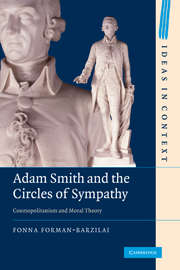Introduction: Smith's oikeiōsis
Published online by Cambridge University Press: 03 May 2010
Summary
The idea of the kosmou politēs is very old, dating back at least to the ancient Stoics. But the idea that we might inhabit a realm beyond our own particular clans, nations, and states has re-emerged at various points throughout history, and with particular salience at the dawn of the twenty-first century. Cosmopolitanism has become a signifier of our times – the word is everywhere – though it has come to mean many things. The description “cosmopolitan” evokes a lifestyle that is enlightened, urban and worldly, one able to navigate the languages, tastes and cultures of the world's great cities with ease and panache. For many Americans the word conjures up images of Helen Gurley Brown's ideal of the independent, liberated “Cosmo” woman of the 1970s, an image reinvented for the 1990s in the wildly successful HBO television series “Sex in the City” and its celebration of “girl talk” over a pink martini-like libation known as a Cosmopolitan. The Cosmo woman's independence consisted in thinking for herself, experiencing her sexuality, and moving through the world loosened from the stifling conventions of domesticity and submissive femininity.
In modern ethical discourse, from Immanuel Kant to Martha Nussbaum and Kwame Anthony Appiah, the cosmopolitan ideal has embodied an imperative that we think for ourselves, that we become increasingly conscious of why we do what we do, that we resist giving ourselves over wholly to the conventions of time and place.
- Type
- Chapter
- Information
- Adam Smith and the Circles of SympathyCosmopolitanism and Moral Theory, pp. 1 - 26Publisher: Cambridge University PressPrint publication year: 2010



